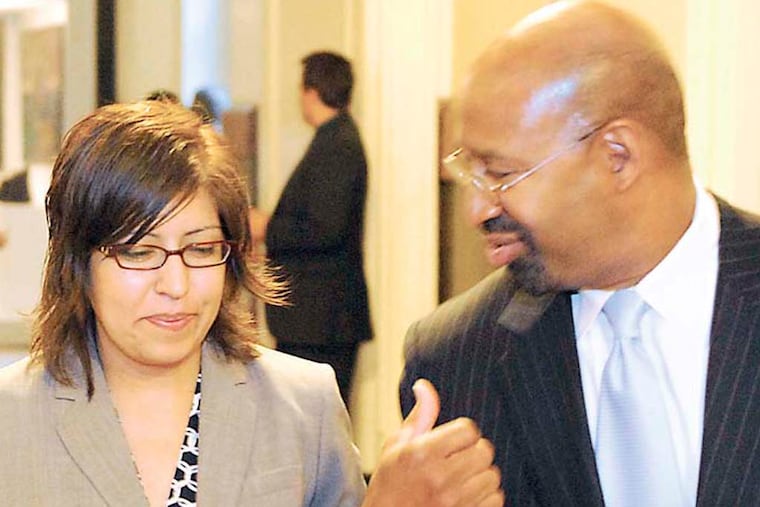Gloria Casarez, 42, Nutter administration LGBT liaison.
She also worked in AIDS and anti-poverty programs.

SEVERAL FRIENDS of Gloria Casarez gathered in a house in her South Philadelphia neighborhood yesterday, and couldn't hold back the tears.
Gloria, Mayor Nutter's liaison to the lesbian, gay, bisexual and transgender communities and a woman who fought for the rights and dignity of everyone who she felt had been marginalized by society, died yesterday after a battle with breast cancer. She was 42.
"We loved her so much," sobbed Franny Price, executive director of Philly Pride Presents, which sponsors the annual Pride Day Parade. Franny said about eight of Gloria's friends got together when they learned of her death.
"We came together to talk about Gloria, to try to cheer each other up, to look at some old pictures of her," Franny said. "She was a leader of our community for a long time. She was a wonderful person, someone you could vent to."
"Gloria was a fun, serious, strong and kind person who always wanted to do more for others, and who fought for equality of rights for all people," said Mayor Nutter, who appointed her as the first director of the Mayor's Office of Lesbian, Gay, Bisexual and Transgender Affairs in April 2008.
"We all loved Gloria's commitment and spirit. She was a fighter and champion, personally and professionally. I knew when I met her I had found the right person to serve as the director of the LGBT office, but more importantly, that I had met a great person. Her judgment and influence were felt throughout the administration on a broad range of issues."
To know that Gloria was a woman of strong will and determination, all one had to do was look at the serious expression on her face as she reared back to throw the first pitch at the ninth annual Gay Community Night at the Phillies, a drizzly August evening as the Phillies prepared to meet the Astros at Citizens Bank Park.
The 5-foot-1 brunette was determined not to embarrass herself and had trained for this moment. She wasn't about to let her fans down. And she didn't. The ball went straight and true into the catcher's mitt as the crowd roared.
It was hard not to get behind this feisty woman who took on the role of champion of the oppressed and pushed her agenda through whatever obstacles society or government threw in her path.
She worked not only for LGBT issues, but on AIDS and anti-poverty programs. She was a founding organizer of the Philly Dyke March.
"She was a warrior," said Rue Landau, executive director of the Philadelphia Commission on Human Relations, who often worked with Gloria on various issues.
"She spent her life fighting for justice and equality for all people facing oppression. We're all better off for the work she's done. She leaves a strong legacy."
"She was an awesome woman," said Gloria's wife, Tricia Dressel. "She was incredibly passionate and full of life. She was a warm, fierce leader who knew how to bring people together to work for a cause."
Tricia, human-resources director for the homeless-advocacy group Project HOME, had been with Gloria for 13 years. They were married in New York state in 2011.
"She was diagnosed with cancer when she was 37," Tricia said. "She told me, 'I'm not dying. I'm going to live my life, every moment, every day.' "
Gloria was born in Philadelphia to Elisa Gonzalez. Her father was never in her life, and her parents divorced when she was a baby.
When it was time for high school, she wanted to get away from Kensington, which was then in a steady state of deterioration. She moved to New Jersey, where she attended Haddon Township High School.
She went from there to West Chester University, where she earned degrees in political science and criminal justice, and was active in the Latino Student Union.
Gloria became a founding member and community organizer for Empty the Shelters, a national housing-rights and economic-justice organization. She later became a coordinator for the LGBT Center at the University of Pennsylvania.
In 1999, Gloria became executive director of the Gay and Lesbian Latino AIDS Education Initiative. She worked hard to increase resources and develop programs serving minorities and the transgender community. She held the post until she joined the Nutter administration in 2008.
"She was a very warm person, very high-energy, smart, sensitive and friendly," said Jane Shull, executive director of Philadelphia FIGHT, the AIDS service organization. "She was really dedicated to her job. When Mayor Nutter picked her, I thought it was a really smart move on his part."
Chris Bartlett, executive director of the William Way Center, an LGBT outreach organization, said Gloria "made a huge difference in the city. The work she did will live on for decades."
She is survived by her wife and her mother.
Services: Were being arranged.